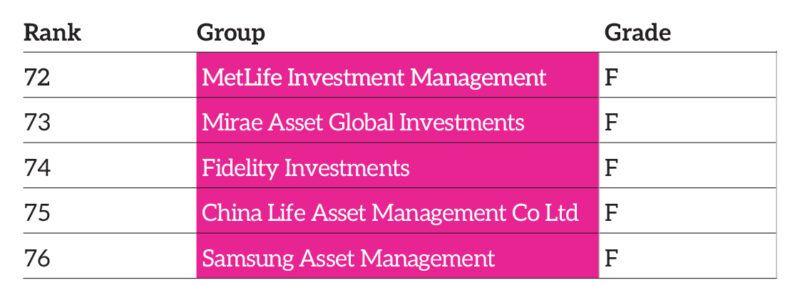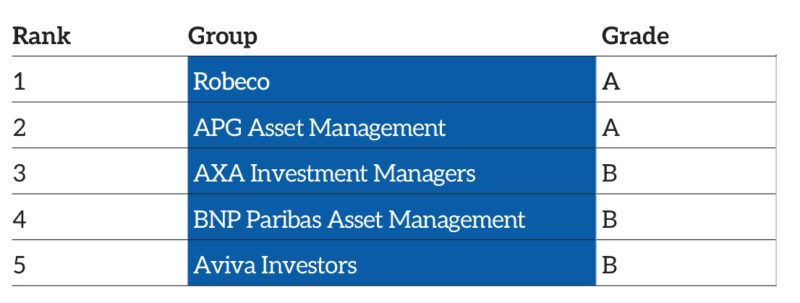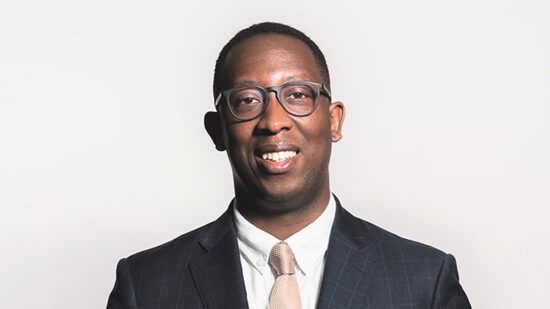Asset managers are paving the way for fossil fuel expansion, environmental degradation and the proliferation of dangerous arms, including nuclear weapons, according to the latest research from ShareAction.
Across the board, investment firms “are failing to consider the long-term interests of asset owners”, with progress in the industry stagnating as social and environmental crises deepen, the fifth edition of Point of No Returns states. While asset managers might have reasonable policies across a small number of their funds, the findings call into question their broader approach, which prioritises short-term profit over long-term sustainability.
Also read: ShareAction decries ‘worst voting performance yet’ on environmental and social resolutions
The research ranks 76 of the largest players in the market, who together control over $80trn in assets under management, on whether they meet achievable responsible investment standards.
ShareAction set 20 attainable standards that asset managers are expected to achieve, but 87% of the managers didn’t even meet half of them. The standards asked whether asset managers are including robust climate policies, avoiding damage to important ecosystems and protecting human rights. All were met by at least one asset manager, but those who failed to take steps to protect people and planet included the four largest asset managers in the world – BlackRock, Fidelity Investments, State Street Global Advisors and Vanguard.
Bottom ranked asset managers

Claudia Gray, head of financial sector research at ShareAction, said: “We are seeing progress stagnate on responsible investment at a time when rapid action is needed. As critical middlemen of the financial sector, asset managers make decisions on behalf of clients like pension funds, who ultimately represent the interests of millions of people. If the financial sector keeps failing to address climate change, nature loss and social inequality, there will be considerable economic consequences, threatening the safe and healthy world we all want to live in.”
Key findings
The report comes as the wider industry is faced with political pressures and an intensifying ESG ‘backlash’, particularly in the US. However, ShareAction’s research revealed the slowdown in new commitments from asset managers predates this. Of the 60 firms featured across the charity’s three last benchmarks, all asset managers with a tobacco or coal commitment in the 2025 report already had one in 2022.
ShareAction identified only four asset managers with sufficiently strong fossil fuel policies across major fuel types, all based in Europe: APG Asset Management, Nordea Asset Management, Ofi Invest Asset Management and SEB Asset Management.
Top ranked asset managers

Meanwhile, less than a third of asset managers have a restriction on all major controversial weapon types. Exceptions in firms’ policies mean that only six out of the 76 managers in the assessment can be reliably expected not to profit from the production of nuclear weapons. And, despite decades of awareness of the health impacts of tobacco, only a quarter of asset managers restrict investment in tobacco across most of their funds.
Nature loss was also a major cause for concern, with more than half of the asset managers in the benchmark failing to meet a single standard on biodiversity. While some are now disclosing assessments of impacts and dependencies on nature, most asset managers do not consider nature risk in policies for high-impact sectors such as agriculture, mining and fisheries, and do not have any restrictions that protect areas of global biodiversity importance.
That said, a few European asset managers are demonstrating robust responsible investment policies and practices, with Robeco landing the top spot in the benchmark for the third successive time, suggesting that a more robust regulatory framework can help drive greater positive impact.
For ShareAction, this underlines the critical importance of safeguarding sustainable finance regulation in the EU and UK. But recent proposals in the EU, particularly the Omnibus package, raise concerns and risk weakening key sustainability rules in a moment when they must be defended.
Gray continued: “It’s encouraging to see some asset managers leading the charge on responsible investment, but ultimately we need others to follow suit and for ambition to be much higher right across the sector.
“Asset owners need to push asset managers to secure their long-term interests. At this critical time, they must keep the pressure on their managers to take the steps needed to protect people and planet for generations to come, even if it means ending relationships with firms who fail to meet their expectations on responsible investment.”








